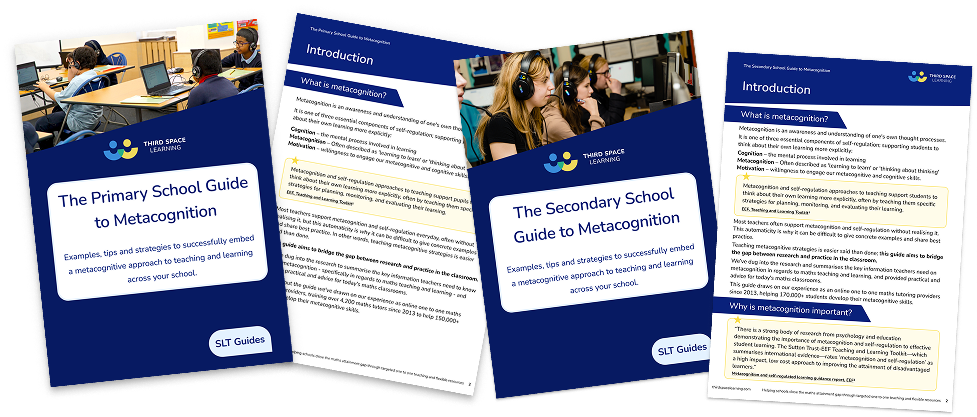Understanding Maths Anxiety At School And What Teachers and Parents Can Do To Support Children
Maths anxiety is a phenomenon that has been around for more than 50 years and is something that affects many young mathematicians throughout primary school and beyond. Here former mathematics leader and Deputy Head shares what he’s learnt about how to overcome it.
What is maths anxiety?
Maths anxiety is as a negative emotional reaction to mathematics, leading to varying degrees of helplessness, panic and mental disorganisation that arises among some people when faced with a mathematical problem.
“A negative emotional reaction to mathematics, leading to varying degrees of helplessness, panic and mental disorganisation that arise among some people when faced with a mathematical problem.”
Well, that is the definition of maths anxiety, according to the Maths Anxiety Trust but reactions to the concept of maths anxiety among adults may be divided. Some of you may not even know that it’s a real thing. Other people reading that statement are sitting there saying ‘That’s me!’?
The Ultimate Guide to Metacognition
A step-by-step guide to teaching metacognition across your primary or secondary school. Includes 10 practical strategies.
Download Free Now!From tortuous to teaching: how I dealt with my own maths anxiety
I remember finding ways to get out of maths lessons as a youngster.
My favourite ruse was to offer to tidy up the teacher’s cupboard – I even clearly remember stacking the maths textbooks neatly on the shelves, feeling inwardly smug that I did not have to open them and attempt the questions inside.
I recall my dad spending what seemed like hours with me trying to help me understand negative numbers and how to calculate them – unfortunately, his pictures of eggs and egg cups didn’t help at all although I appreciated his efforts!
My relationships with my secondary maths teachers were never great – firing a huge elastic band into one’s eye really didn’t help (will always regret that) and spending most of the time chatting to literally anyone I was moved to sit with wasn’t exactly productive either.
In fact, at secondary school, I hated maths.
It was only when I became a teacher, and had to teach primary maths, that I began to understand maths for myself.
In order to teach it to the children I had to know what I was talking about, and by breaking things down into small steps, and by striving to understand the inner workings of the mathematical processes I was teaching, I became much more confident in maths.
In fact, I spent three years recently leading on maths throughout school and have written many articles about how to teach primary maths – that’s progress!
It’s also an encouragement: maths anxiety can be overcome.
But before we look at how to overcome it, let’s look at the facts and figures surrounding maths anxiety.
This is a fantastic video from the team at childline which explains what anxiety is in child friendly terms.
Does maths anxiety affect mathematics performance?
A 2018 Ipsos MORI poll found that 23% of parents of children aged 5-15 report that their eldest child often feels anxious when attempting the solving of mathematical problems, and that maths anxiety seems to be affecting the more recent generations.
The study found that 36% of younger (15-24 year-olds) people feel anxious about maths, compared to 10% of older people (65+), and some studies suggest that maths anxiety can begin very early when young children are learning basic number skills.
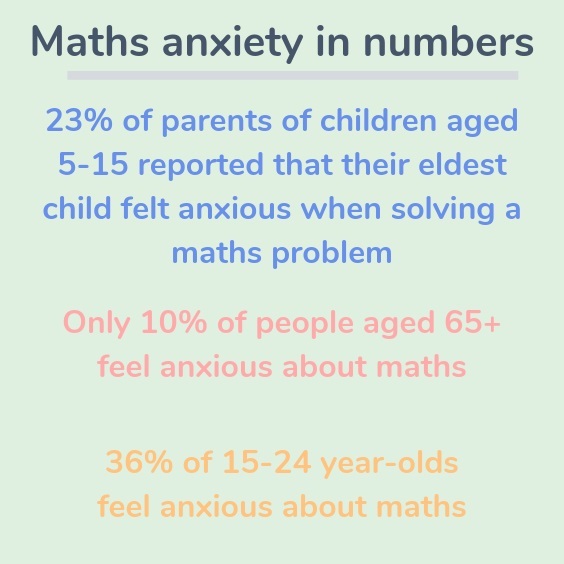
Read more: How To Reduce Your Students’ Exam Anxiety
A fear of maths isn’t restricted by age, gender, or even position in school
In addition to the age based anxiety discussed above, it is also worth noting that recent research from Cambridge University found that girls are more likely to report maths anxiety than boys.
In another recent survey at two schools (a boys’ and a girls’ school), along with 25% of children in each school identifying that they suffer from maths anxiety, 20% of the staff in one of the schools said that they too experience maths anxiety.
This means that not only are our students feeling panicky with maths, but some of their teachers are as well.
Some research shows that when teachers experience maths anxiety they can pass it on to their pupils, especially in the case of female teachers and female pupils.
This shows just how far reaching maths anxiety is in the modern day, and illustrates why we need to pay it more attention than we currently do.
“Teachers, parents, brothers and sisters and classmates can all play a role in shaping a child’s maths anxiety.” – Ros McLellan, co-author on a paper on Understanding Mathematics Anxiety.
Maths often causes more anxiety than other school subjects
Many point out that we don’t treat reading the same as we do maths. For example we don’t say
“Oh I was never any good at reading.”
or
“Reading is too difficult for me.”
And yet, many of us say the very same things about maths.
Is this as a result of maths anxiety, or do these attitudes contribute to maths anxiety?
With negative feelings about maths being at a high, the proportion of adults with functional maths skills (equivalent to a GCSE grade C) fell from 26% in 2003 to 22% in 2011 and is currently estimated at 24%, which is a stark contrast with the 57% who achieved the equivalent in functional literacy skills.
Again, does this struggle with maths lead to maths anxiety or is it a cause of it?
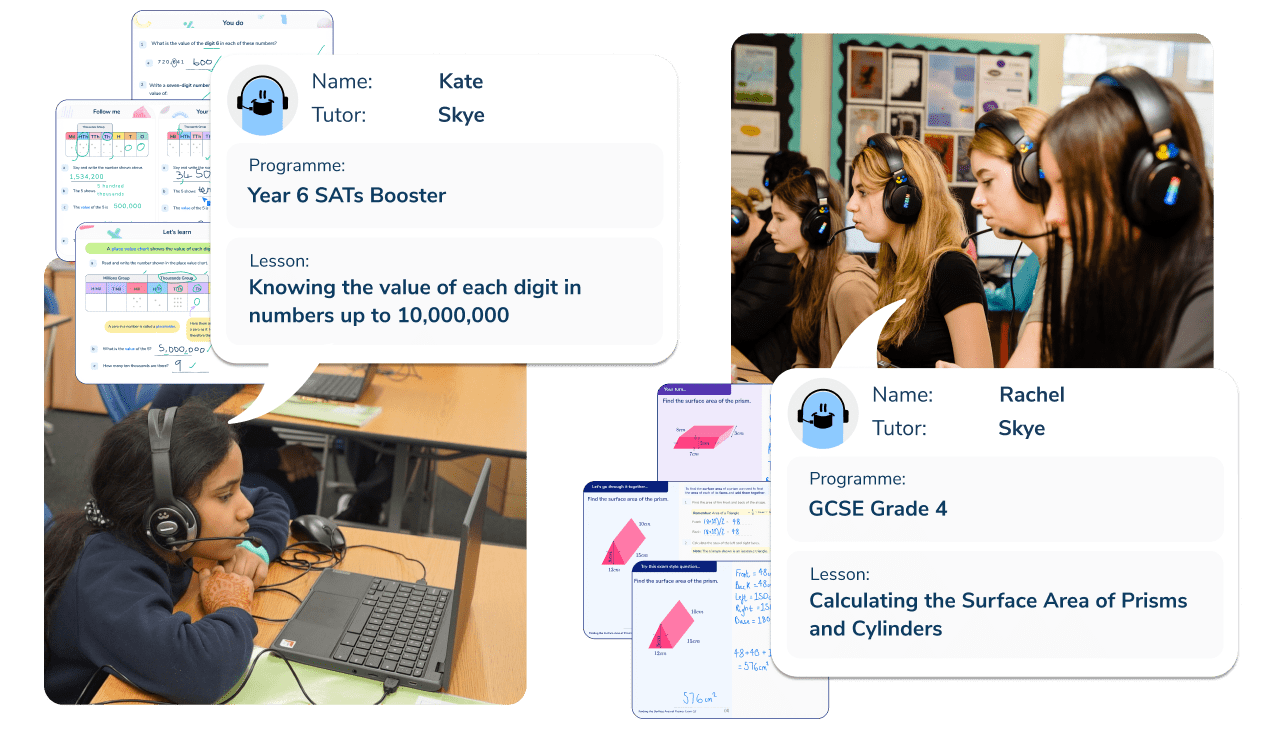
Meet Skye, the voice-based AI tutor making maths success possible for every student.
Built by teachers and maths experts, Skye uses the same pedagogy, curriculum and lesson structure as our traditional tutoring.
But, with more flexibility and a lower cost, schools can scale online maths tutoring to support every student who needs it.
Watch Skye in actionWhat causes maths anxiety?
There are three theories that link maths anxiety and maths performance:
- Poor performance leads to higher maths anxiety (deficit theory)
- A vicious cycle: higher anxiety contributes to poor performance; poor performance contributes to higher anxiety (reciprocal theory)
- Maths anxiety leads to poor performance in maths (anxiety model)
At the moment there isn’t an agreement as to which of these theories, if any, is correct.
What is known is that the two are linked: if a child suffers from maths anxiety they are more likely to perform poorly; if a child performs poorly they are more likely to suffer from maths anxiety.
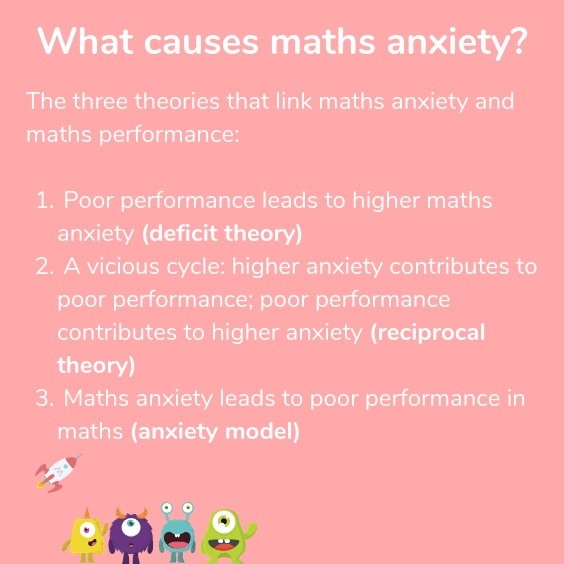
What are the signs of maths anxiety?
Maths anxiety is more than just a lack of confidence in tackling a new and harder problem in maths.
- At a most basic physical level children often try to anything to avoid being anywhere near any kind of mathematics – my hiding in a cupboard was a classic version of this!
- Classic physical symptoms include shaking, sweating, nausea and any nervous reactions like nail biting or lip biting
- A sense of helpless is common and can lead to shutdown where a child stops listening or evening trying
- Confusion and frustration may then lead to crying and raging
- Feelings of tension and extreme stress before and during exams may be such that additional time and support may be required
- Older students can be disruptive, distracting the teacher as much as possible in order to derail any maths lesson.
- And of course the end result can be refusing to go to a maths lesson.
When students reach secondary school they can become unwilling or embarrassed to talk about the roots of any behavioural issues so it’s often worth checking if there’s a pattern in intermittent school refusal for example. Is it just on a maths lesson day?
Overcoming maths anxiety at home and at school
So what do we do for those children who, like a younger me, look at a maths problem and just see a swimming blur of numbers and symbols and feel a sickness in the pit of their stomach?
How do we help those who feel overwhelmed by a maths question to the point where they just want to cry out in anguish?
Fortunately there are a number of things teachers and parents can do.
Teaching tips to help children overcome maths anxiety
The best thing one can do as a teacher is just to be on the look out for maths anxiety; simply by identifying it you will be better placed to support them.
The steps you take may depend at what stage of a child’s development you identify their maths anxiety – by secondary school, negative attitudes may be quite firmly embedded and it may take longer to address, so the sooner you can take action the better.
Parents can do a lot to support a child with maths anxiety at home – see the tips below. In class however, your role is to be ready to adjust your teaching approach to accommodate the potentially triggering of high levels of maths anxiety.
So for example be aware of the demands that learning new content can place on working memory and ensure that, where ever possible you have designed your activities with cognitive load theory in mind. If a child starts to experience cognitive overload this can trigger maths anxiety symptoms. Learn more about cognitive load theory in the classroom here.
- Use carefully selected teaching strategies and maths intervention strategies to break new teaching moments down into their smallest components so that your learners can continue to have small wins on their way to experience challenge.
- Build up confidence with some standard definitions and ways of explaining that children can start to internalise and know by heart. Sentence stems are fantastic for this.
- Provide lots of practice opportunities particularly through example problem pairs which enable children to feel supported as they progress.
- Don’t be afraid of providing additional concrete resources even for secondary school students when working on manipulation of number. By starting from the concrete you can ground young people’s understanding of a new maths idea and then move gradually from this to the more conceptual.
- Where resources allow, dedicated one to one maths interventions are the gold standard in breaking through maths anxiety barriers. At Third Space Learning, we leveraged our experience as online tutoring providers and the power of AI to develop an AI maths tutor trained to support, coach and nurture an anxious child through their online maths lesson.
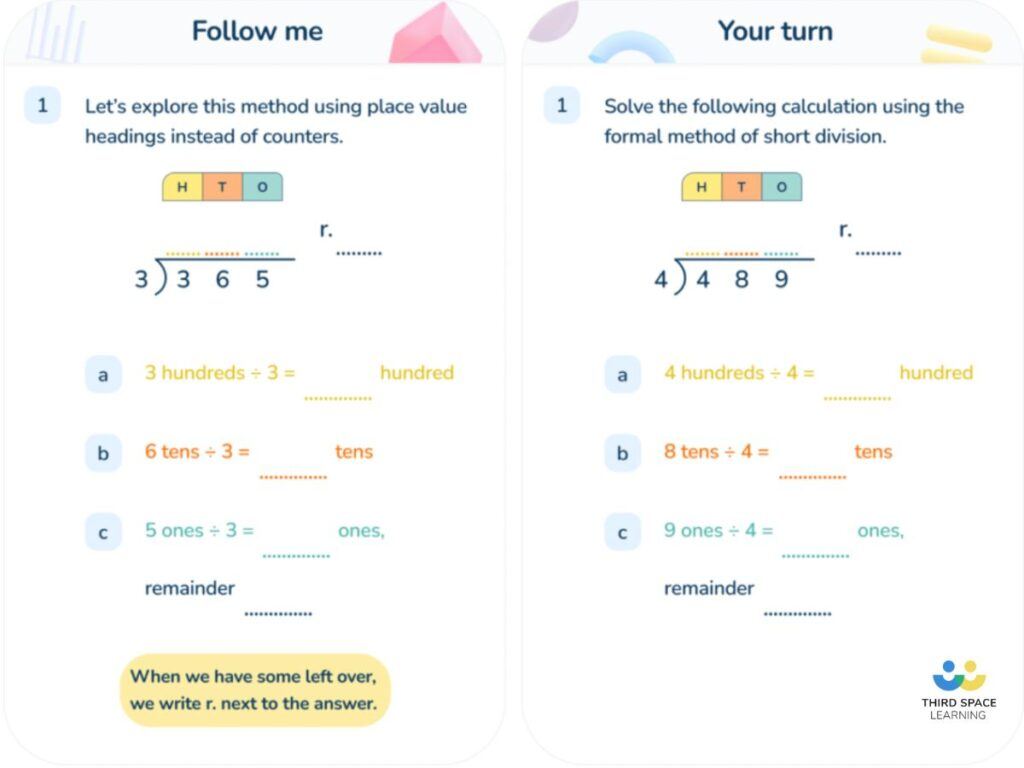
Whenever you’re looking for new maths interventions from any provider consider how you can mitigate any anxiety. At Third Space Learning, Skye, the AI maths tutor, will always demonstrate any question answering method before asking a child to join in, removing the scaffolding as appropriate to the individual. This “follow me” and “your turn” approach will be familiar to any student who’s experienced ‘I do, We do, You do’ in their lessons and has been specially designed to support students and ease them in to new maths concepts.
Parent and carer tips to help children overcome maths anxiety
Below is a list of suggestions to help a child to overcome their maths anxiety at home or in a one to one or small group environment with a teaching assistant. Many of these are suitable for all ages, but as highlighted above, the earlier you can take steps to mitigate a child or young person’s maths anxiety the better.
1. Make sure you do regular practice, little and often
Parents can sometimes expect too much of children at home after a day at school, and whilst it is important that practice is done, make sure you are not pushing your child to do too much.
10 minutes a day is better than a gruelling 45 minute session on a Sunday afternoon. This 10 minute maths activity is a prime example of something simple you can do at home to help your child.
This repeat, daily practice complements what we know about how we learn best: if we regularly have to recall something, drawing it out of our memory, then we are more likely to be able to remember it for longer.
We also know that we can suffer an overload in our brains if we try to do too much – especially too many different things – so try to keep the work focused on one or two mathematical concepts at a time.
Once your child is at secondary school, make sure you check in with them on what their maths homework is and how they are feeling about it. It’s easy to assume that because a child has vanished into their room ‘to do their maths homework’ that that’s what they’re doing. They may need a little support and encouragement from you to get started.
2. Practise only what has been taught already
Don’t try to teach new things at home, especially if you are expecting your child to do most of the work on their own.
Homework for primary-aged children works best when it is follow-up of work that they have already done at school and when it is done with a parent.
Many younger school children do not yet have the self-regulation skills they need to sit down and complete a piece of homework themselves so it is important that if you want to help your child with their maths anxiety, that you accompany them.
Don’t start anything new. If their eyes glaze over as you explain, stop it and remind them to ask the teacher.
3. Make maths a part of everyday life
Parents have a real opportunity to make maths real – arguably even more than teachers do at school.
For example, when you are out and about in ordinary life, doing the shopping, doing DIY jobs, cooking in the kitchen, and so on, there are plenty of opportunities to have maths-based discussions (you don’t always have to ask them questions).
You could help them to understand coin denominations when giving pocket money; ask them what the time is and talk about how long it will be until tea time; discuss when setting the table how, if each person has three pieces of cutlery, and there are five people eating, that there will be 15 pieces of cutlery on the table.
When you start to look for maths opportunities in everyday life you will start to notice them everywhere!
In a rush and want to come back to these points later? Save this handy infographic:
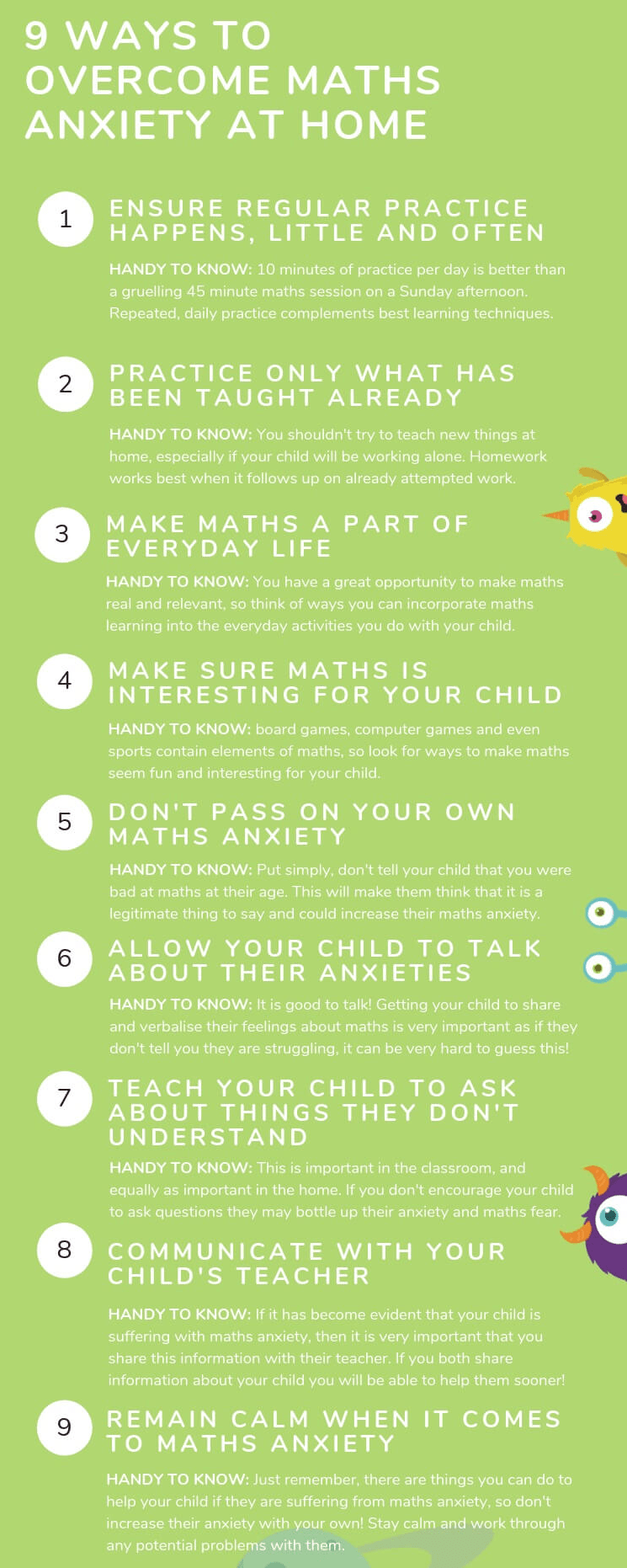
4. Make sure maths is interesting for your child
Not only can you look for the natural opportunities, but you can also introduce chances to talk about and explore maths.
Most board games, and many computer games, feature lots of maths opportunities.
There is some evidence that enjoyment is a good motivator and that children learn when they are happier so it is worth making maths into something that is fun. Third Space Learning have a range of maths games you can play, suitable for all ages:
5. Don’t pass on your own anxiety
Don’t tell your children that you were bad at maths.
This will only make them think that it is a legitimate thing to think and say.
You want them to feel like they can be good at maths, and that there are no reasons as to why they shouldn’t be. Ensure that they know this and help them to maintain a positive attitude, even when the going gets tough!
Try developing some affirmations (or Mathirmations, if you will!):
- “I CAN learn my times tables.”
- “I WILL be able to find fractions of amounts.”
- “There is NO reason why I can’t be awesome at maths!”
and get them to practise saying them aloud – positive self-talk may help here.
6. Allow your child to talk about their anxieties
Talking of talk, it’s always a good idea to get those thoughts and feelings out in the open – a problem shared is a problem halved (nice mathematical saying there).
It actually seems that, for children who suffer maths anxiety, it is a good idea to do this directly before they attempt any maths – some research has shown that doing this helps people to go on to be more successful in the maths task at hand.
Children should be allowed to verbalise their feelings – often this can make them feel less like they are the only one who struggles.
Simply trying to quash any anxieties around maths is not a healthy way to deal with these feelings.
And remember, if it is indeed good to talk, it is also good to listen when children share these anxieties – ensure that they know and feel that they have been heard.
If your primary school child mentions any maths terminology you are not sure of, take a look at our primary maths dictionary for kids to discover what it means.
And if your secondary age student needs maths help, take a look at this free secondary maths resource library. It’s likely to cover any topic either of you are struggling with. And even if you still don’t understand the maths concept you’re researching, modelling the fact that you are okay with this, and you realise you too have gaps that you need to fill, is incredibly powerful. It shows your child it’s fine not to know and that by taking small steps you can get there.
Which brings us to point 7.
7. Teach your child to ask questions when they don’t understand
This is crucial in the classroom and it is equally as important at home.
The struggling mathematician can often find it easy to hide their difficulties, finding ways to cope which don’t ever result in their better understanding.
In order to help children not to resort to these, foster the idea that it is OK to ask for help and that it is OK to make mistakes – reinforce the idea that we learn when we make mistakes and we learn when we ask for help.
8. Ensure that all key adults are aware of a child’s maths anxiety
If you know that your child is suffering from maths anxiety then let their teacher know. Discuss with them potential strategies for both home and school and work in a partnership.
You may be able to help them to understand something that you know about your child that perhaps they don’t.
The teacher may be able to show you how you can help your child with a particular bit of maths that they are struggling with. By working together, you will have the best chance of helping your child to deal with, and overcome, maths anxiety.
9. Remain calm when it comes to maths anxiety
The most important thing to remember is to keep your cool if your child is showing signs of maths anxiety. At some point during their primary school life, most children will come up against a challenging area of mathematics and seem to struggle.
All you need to do in this scenario is remain calm, and use the tips you have learnt in the blog above to steer them through their troubles and help them come out the other side as confident mathematicians!
A final point – help exists for any child – or adult – with maths anxiety, whatever their age. So please don’t suffer alone and, if matters don’t improve, get in contact with the Maths Anxiety Trust who are always happy to advise.
Read more
DO YOU HAVE STUDENTS WHO NEED MORE SUPPORT IN MATHS?
Skye – our AI maths tutor built by teachers – gives students personalised one-to-one lessons that address learning gaps and build confidence.
Since 2013 we’ve taught over 2 million hours of maths lessons to more than 170,000 students to help them become fluent, able mathematicians.
Explore our AI maths tutoring or find out about school tutors for your school.



